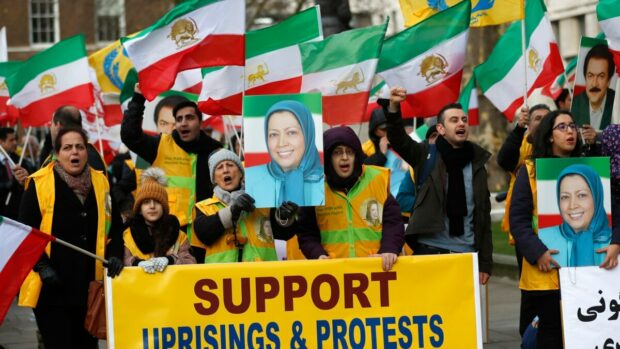
Last month, 82 members of the Scottish parliament signed a statement affirming their support for protesters in the Islamic Republic of Iran.
Their majority support was revealed at a special meeting in Westminster, on Wednesday, attended by MPs and peers from all parties. The document signed by the 82 MSPs also recognised the nature and importance of the underlying movement for regime change.
This declaration is of key importance, as it comes at a time when the Iranian regime is working tirelessly to promote the idea that the status quo has been reestablished across the country, following the most recent nationwide uprising that began last September, after the 22-year-old Kurdish woman, Mahsa Amini, was killed by morality police’ in Tehran.
In fact, the clerical regime is still struggling to restore order, facing the dawning realisation that it may never succeed in doing so.
Women continue to go about their daily lives without wearing the legally mandated hijab.
Meanwhile, videos continue to reach social media from cities and towns across the country, showing that young women and men are still chanting provocative, anti-government slogans on a nightly basis.
Many of the slogans call for “death to the dictator”, deliberately recognising no difference between the current regime’s supreme leader and the Shah who was overthrown in 1979, despite the surprise re-emergence of the Shah’s son, Reza Pahlavi. The recurring nationwide protests have been coordinated since at least 2014 by a network of “Resistance Units” affiliated with the leading pro-democracy opposition group, the People’s Mojahedin Organization of Iran, or MEK. This group stands at the head of a coalition known as the National Council of Resistance of Iran (NCRI), which in turn has designated someone to serve as transitional president after the mullahs are overthrown.
That official, Maryam Rajavi, has outlined a ten-point plan for Iran’s future, which lays the groundwork for the country’s transition to a secular-democratic system, of the kind that would fit seamlessly in the modern community of nations.
The plan provides 85 million repressed and impoverished Iranians with something worth fighting for, so it is little wonder that they have continued to push for regime change over the course of the past eight months, in open defiance of a brutal crackdown, which has left more than 750 people dead and precipitated a surge of executions by the regime, designed to terrorise the dissenters.
At the same time, Mrs Rajavi’s ten-point plan also provides the UK and other Western powers with something concrete to support.
With the statement on Iran signed by the majority of members of the Scottish Parliament, that knowledge gap is now being filled and the international community will begin to understand what could be accomplished by the broad adoption of assertive policies toward the Iranian regime – specifically policies that aim to offer a viable, democratic alternative to that tyrannical regime.
Toward that end, this statement is urging the British government, the EU and its member states to sever existing ties with the Islamic Republic and to follow the US example in blacklisting the Islamic Revolutionary Guard Corps (IRGC) as a terrorist organisation. The statement also asks Western governments, the International Criminal Court, and all other relevant bodies to demand legal accountability from those Iranian officials and institutions that have violated human rights en masse, both before and during the latest Iranian uprising. In a breakthrough that has rocked the Iranian regime and fired a shot across the bows of western appeasers, 109 former world leaders have joined Scotland’s MSPs in signing a similar joint statement of solidarity with the people of Iran, showing their support for the opposition NCRI and its key constituent organisation – the MEK.
A solid majority of the Scottish Parliament, including members from all parties and a dozen different committee chairs, have now formally recognised that the Iranian people reject all forms of dictatorship and are working to establish a secular, democratic system based on the rule of law. It is fair to say that there is no cause more worthy of support from democratic governments.
Former MEP Struan Stevenson is the Coordinator of the Campaign for Iran Change (CiC)

Enjoy the convenience of having The Sunday Post delivered as a digital ePaper straight to your smartphone, tablet or computer.
Subscribe for only £5.49 a month and enjoy all the benefits of the printed paper as a digital replica.
Subscribe